 Request a FREE Sample of our FcRn Binding Kit!
Request a FREE Sample of our FcRn Binding Kit! Request a FREE Sample of our FcRn Binding Kit!
Request a FREE Sample of our FcRn Binding Kit!
 Limited Edition Golden Llama is here! Check out how you can get one.
Limited Edition Golden Llama is here! Check out how you can get one.  Limited Edition Golden Llama is here! Check out how you can get one.
Limited Edition Golden Llama is here! Check out how you can get one.
 Request a FREE sample of our GMP products!
Request a FREE sample of our GMP products!  Request a FREE sample of our GMP products!
Request a FREE sample of our GMP products!
| Cat. No. | Species | Product Description | Structure | Purity | Feature |
|---|---|---|---|---|---|
| GMP-L21H25 | Human | GMP Human IL-21 Protein |  |

|
|
| IL1-M52H3 | Mouse | Mouse IL-21 Protein, His Tag |  |

|

|
| CRS-A010 | Human | resDetect™ Human Interleukin-21 (IL-21) ELISA Kit (Residue Testing) | |||
| IL1-C52H9 | Cynomolgus | Cynomolgus IL-21 Protein, His Tag |  |

|

|
| IL1-H5213 | Human | Human IL-21 Protein, premium grade |  |


|
|
| IL1-H5253 | Human | Human IL-21 Protein, Fc Tag |  |

|

|
| IL1-H82F7 | Human | Biotinylated Human IL-21 Protein, Fc,Avitag™, premium grade |  |

|


|

GMP Human IL-21 Protein (Cat. No. GMP-L21H25) stimulates secretion of IFN-γ by NK-92 human natural killer lymphoma cells stimulated with 10 ng/mL GMP Human IL-15 Protein (Cat. No. GMP-L15H13). The specific activity of GMP Human IL-21 Protein (Cat. No. GMP-L21H25) is > 1.00×10^5 U/mg (QC tested).

Human IL-21, premium grade (Cat. No. IL1-H5213) stimulates secretion of IFN-γ by NK-92 human natural killer lymphoma cells stimulated with 10 ng/mL Human IL-15, premium grade (Cat. No. IL5-H4117). The specific activity of Human IL-21, premium grade (Cat. No. IL1-H5213) is > 1.00×10^5 U/mg (QC tested).

Biotinylated Human IL-21, Fc,Avitag, premium grade (Cat. No. IL1-H82F7) immobilized on CM5 Chip can bind Human IL-21 R, Fc Tag (Cat. No. ILR-H5257) with an affinity constant of 0.165 nM as determined in a SPR assay (Biacore 8K) (Routinely tested).
| Name | Research Code | Research Phase | Company | Indications | Clinical Trials |
|---|---|---|---|---|---|
| Avizakimab | BOS-161721 | Phase 2 Clinical | Medimmune, Boston Pharmaceuticals Inc | Lupus Erythematosus, Systemic | Details |
| IL-21 mab (Lilly) | Phase 1 Clinical | Eli Lilly And Company | Immune System Diseases | Details | |
| hV-01 | hV-01 | Phase 1 Clinical | Hangzhou Converd Co Ltd | Solid tumours | Details |
This web search service is supported by Google Inc.
